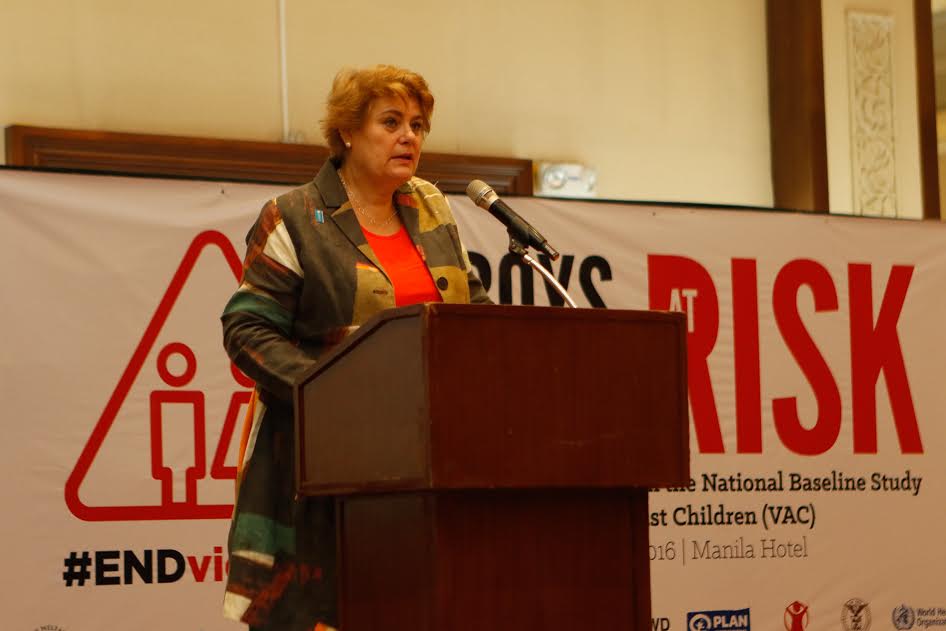A two-day Research Forum titled ‘Boys and Girls at Risk’ concluded today pledging totake forward the preliminary results of the Philippines’ first ever National Baseline Study on Violence against Children(NBS-VAC)toward a strong prevention and response plan to stop violence against Children in the Philippines. NBS-VAC Study is scheduled to be launched in October.
Organized by the Council for the Welfare (CWC) of Children and UNICEF working within a wider partnership of national and international organizations working for preventing Violence against Children, the Research Forum was participated by over 200 researchers, academics, advocates and professionals working to End Violence against Children.

The Research Forum concluded by articulating a set of practical recommendation as critical steps in moving forward.
Initial results presented by experts touched on the various settings of forms of violence that children experience: physical, psychological and sexual abuse at home, in school, the community and online.They also suggest that while both boys and girls are equally vulnerable to violence, boys can be twice more likely to experience severe physical violence. Younger children are exposed to higher risk in these settings. Violence against children has been cited to affect children’s physical and psychological health, impede their growth and development, and perpetuate a cycle of violence in society.
Experts from an array of related fields examined not only the Study outcome but in-depth the issues of social and cultural norms, economic, gender and legal aspects as drivers of VAC that needs attention in formulating strategic multi-stakeholder response plan to end violence against children.
In her opening remarks, Department of Social Welfare and Development Secretary Corazon Juliano-Soliman congratulated CWC and UNICEF for persistently following up over the past years and for taking the lead in completing the challenging but useful Study. “From this point on, steps will be taken to renew our conviction to transform the Philippines into a safer and more nurturing environment for children. This is both about improving policies and connecting the policies with implementation at the community level.”
“Violence against children happens everywhere, across all social groups; and with the most violent acts carried out by people that children know or should be able to trust. The government has called for strong action to prevent Violence against Children, respond to and rescue victims, and prosecute the perpetrators,” Secretary Soliman said.
The Secretary added thatVAC is a priority agenda for the government, with the Philippines has been selected to be a Pathfinder Country within the Global Partnership on VAC;putting a spotlight on the country as a pioneer of new and vigorous approaches to end violence. Pathfinder countries will be at the forefront of the Global Partnership in preventing violence, protecting and making the society safer for children.
The Philippines is well placed to join the global priority agenda stipulated in the United Nations’ Sustainable Development Goals (SGDs), in which VAC is a worldwide priority agenda to “end abuse, exploitation, trafficking and all forms of violence and torture against children (SDG 16.2).
Discussions at the forum centred on how to drive policy reforms and improve national child protection mechanisms; stronger cooperation between government and NGO partners as programme implementors; and share best-practices from across the region.
Looking at violence from the perspective of what it does to children, UNICEF Philippines Representative Lotta Sylwander said, “I draw your attention to the vulnerabilities of children facing different forms of violence. Vulnerabilities deepened by experiencing violence from those that they most trust such as parents, siblings, teachers in places where they ought to feel safe such as home, school and neighbourhood.”
“Difficult as some of the findings are, let us be armed by the solid knowledge and evidence generated by the Study to create stronger grounds for prevention and response. We count on this Forum to guide the formulation of the crucial next steps. Each and every one of us is responsible to STOP violence against children,” added Ms Sylwander.
Among the recommendations drawn at the forum to urge the national government and partners from other sectors working on the welfare and protection of children, for improved public investment to:
- Sustain capacity building for law enforcement and prosecution agencies personnel
- Continue engaging multi-sector, multi-level partnership with a unified strategy for a more inclusive community engagement approach
- Re-visit the government’s policies and processes on child rescue, safety and rehabilitation; as well as to continue discussion of the existing legislations/bills
- Improve Child Protection systems to widen the scope of children covered/engaged
- Increase advocacy both at the national level and at community level through LGUs, to further educate the communities – parents, schools, local CP centres, health clinics, etc., to be more aware and prepared for local response plans
Sec Soliman and Ms Sylwander joined CWC Executive Director Patricia Luna and Child Protection Network (CPN) Executive Director Dr Bernadette Madrid in gathering the delegates from the Philippine government agencies, NGOs, the academe and national professional associations; from the Indonesian Ministry of Women and Child Protection and ministries for Human Development and National Development Planning; and child protection experts and advocates from the East Asia and Pacific Region.
The Research Forum was hosted by the NBS-VAC Steering Committee chaired by CWC and UNICEF, with the support of DSWD, the Department of Education, Department of Health, Department of Justice; and NGO partners ChildFund, the CPN, Consuelo Foundation, Plan International, Save the Children, the UP-Manila National Institute of Health, and the World Health Organization.The NBS-VAC official launch will be in October 2016, to culminate the ongoing peer review and analysis processes and bring in more groups involved to stop and end violence against children.


